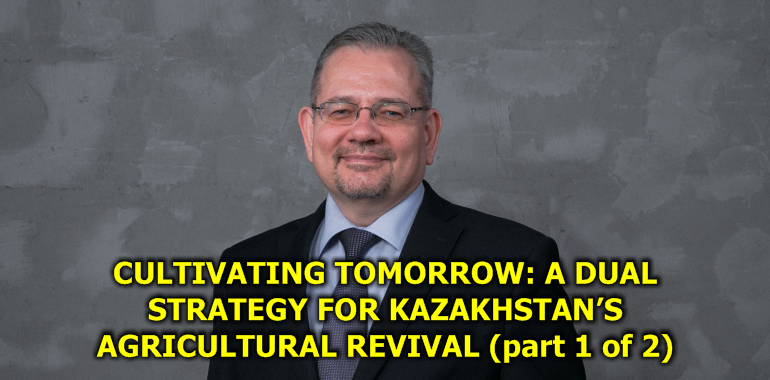Part 1: Modernizing Agriculture in Kazakhstan - A Vision and Strategies.
Introduction:
Agriculture has been a cornerstone of Kazakhstan's economy for centuries, providing sustenance and livelihoods to its people.
As we embark on a new era, with Mr. Saparov Aidarbek Seypellovich taking office as the Minister of Agriculture on September 4, 2023, it is crucial to outline a comprehensive vision and propose modern digital strategies for the development of agriculture in Kazakhstan.
The purpose of this article is to provide the Minister with a roadmap comprising 60 practical tips from Real Estate Group, divided into two parts, for transforming and growing the agricultural sector.
Part 1: Vision and Policy Framework.
1. Establish a Long-Term Vision: Develop a 20-year agricultural vision that aligns with global trends and ensures food security and sustainability.
2. Encourage Diversification: Promote diversification of crops and livestock to reduce dependency on a few commodities.

3. Invest in Research and Development: Allocate resources to agricultural research, fostering innovation and improving crop yields.
4. Enhance Infrastructure: Modernize rural infrastructure including roads, irrigation, and storage facilities.
5. Land Reform: Implement transparent land policies to encourage investment and reduce fragmentation.
6. Climate Resilience: Develop strategies to adapt to climate change and mitigate its impact on agriculture.
7. Digital Agriculture: Promote precision farming, utilizing technology for data-driven decision-making.
8. Market Access: Facilitate access to international markets through trade agreements and quality standards.
9. Farmer Training: Invest in farmer education and extension services to disseminate best practices.
10. Sustainable Practices: Encourage sustainable farming methods, reducing chemical usage and conserving resources.
Part 2: Digital Transformation Strategies.
11. Smart Farming: Promote IoT-based smart farming technologies for real-time monitoring of crops and livestock.
12. GIS Mapping: Develop a comprehensive geographic information system for efficient land management.
13. Crop Forecasting: Implement AI-powered crop forecasting systems to improve supply chain management.
14. Blockchain for Traceability: Utilize blockchain to ensure food traceability and enhance consumer trust.
15. Satellite Imaging: Employ satellite imagery for monitoring land use, crop health, and detecting pests.
16. E-Marketplaces: Establish online platforms for farmers to sell their products directly to consumers.
17. Weather Forecasting: Collaborate with meteorological agencies to provide accurate weather information to farmers.
18. Agritech Incubators: Support startups and innovation in the agritech sector through dedicated incubators.
19. Biotechnology: Promote biotechnology for disease-resistant crops and livestock breeding programs.
20. Eco-Friendly Packaging: Encourage eco-friendly packaging solutions to reduce plastic waste.
21. Data Analytics: Harness big data analytics to optimize resource allocation and increase productivity.
22. Precision Livestock Farming: Implement AI for monitoring livestock health and optimizing feeding schedules.
23. Digital Payment Systems: Facilitate cashless transactions for agricultural products.
24. Rural Connectivity: Expand high-speed internet access to rural areas to enable digital solutions.
25. E-Learning for Farmers: Develop online courses for farmers to enhance their skills.
26. Mobile Apps: Create mobile apps for farmers to access market prices, weather forecasts, and agricultural advice.
27. Drone Technology: Use drones for crop monitoring, pest control, and land surveying.
28. AI in Pest Management: Employ artificial intelligence for early detection and management of crop pests.
29. Crop Insurance: Promote digital crop insurance schemes to mitigate risks for farmers.
30. Smart Greenhouses: Encourage the adoption of smart greenhouses for controlled environment agriculture.
Conclusion:
The development of agriculture in Kazakhstan hinges on a holistic approach that blends a clear vision, policy framework, and digital transformation strategies.
Mr. Saparov Aidarbek Seypellovich, as the new Minister of Agriculture, has a unique opportunity to steer Kazakhstan's agricultural sector towards a prosperous, sustainable, and digitally-enabled future.
These 30 tips from Real Estate Group provide a solid foundation for the first stage of your journey, and 30 more actionable strategies will be covered in the second part of this article.
Together, they represent a comprehensive roadmap towards a thriving agricultural sector in Kazakhstan.






